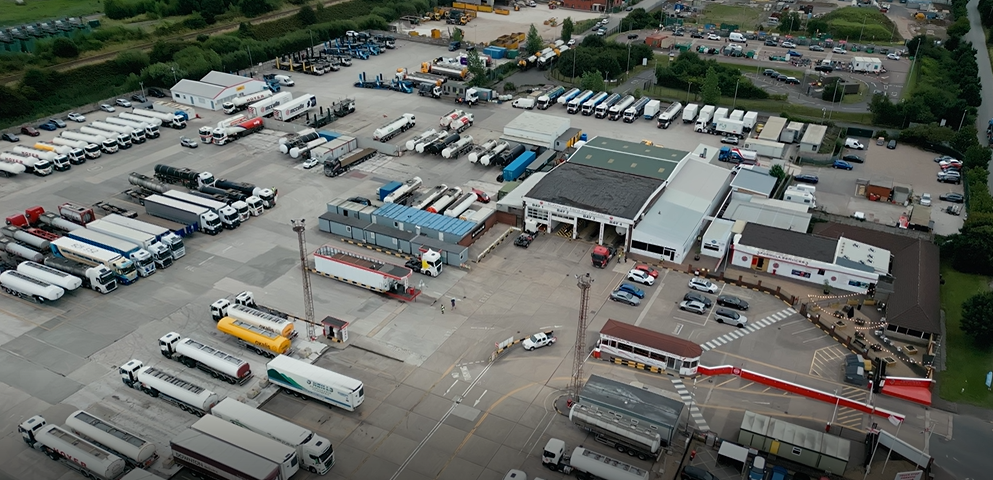
Susie Jones
Jak branża transportowa może wspierać zdrowie psychiczne kierowców?
Utworzony: 07.10.2024
•
Aktualizacja: 10.10.2024
44% kierowców ciężarówek długodystansowych doświadcza objawów depresji - jednak zdrowie psychiczne w branży transportowej jest często pomijane. Charakter pracy odgrywa kluczową rolę w dobrostanie kierowców, którzy mają do czynienia z długimi godzinami w trasie i długimi okresami izolacji. W związku z obchodzonym 10 października Dniem Świadomości Zdrowia Psychicznego, w jaki sposób kierowcy i branża mogą zadbać o swoje zdrowie?
Jak kierowcy mogą dbać o swoje zdrowie psychiczne?
Kierowcy mogą podjąć kilka kroków, aby zadbać o swoje zdrowie psychiczne:
Sen i odpoczynek
Odpowiednia ilość snu jest niezbędna dla zdrowia fizycznego i psychicznego. Długie godziny spędzone za kierownicą ciężarówki mogą zakłócić regularny rytm snu - wprowadzenie rutyny poprawi nastrój, czujność i samopoczucie kierowcy.
Nawodnienie i dieta
Chociaż jest to trudne w trasie, utrzymywanie dobrze zbilansowanej diety i nawodnienia ma kluczowe znaczenie dla uniknięcia spadków energii i wahań nastroju.
Zarządzanie stresem
Częścią zawodu kierowcy ciężarówki jest radzenie sobie ze stresującymi sytuacjami - techniki radzenia sobie ze stresem, takie jak zarządzanie czasem i ćwiczenia relaksacyjne, skutecznie obniżają poziom stresu. Praktykowanie uważności, takiej jak medytacja i głębokie oddychanie, pomaga utrzymać spokojny sposób myślenia.
Ćwiczenia fizyczne
Regularne ćwiczenia są niezbędne dla zdrowia fizycznego i psychicznego. Proste ćwiczenia, takie jak chodzenie, jazda na rowerze lub rozciąganie, uwalniają endorfiny i poprawiają nastrój. Dowiedz się jak zachować zdrowie w drodze.
Rozmowa
Prowadzenie ciężarówki to izolująca praca, w której kierowcy spędzają godziny nie rozmawiając z nikim. Pozostawanie w kontakcie z przyjaciółmi, rodziną i współpracownikami poprzez rozmowy telefoniczne i czaty wideo zapewnia wsparcie i zwalcza poczucie samotności. Postoje ciężarówek oferują kierowcom świetną okazję do porozmawiania z podobnie myślącymi ludźmi o próbach i trudach pracy.
Rób przerwy
Przebywanie za kierownicą przez dłuższy czas może być wyczerpujące psychicznie - robienie regularnych przerw na odpoczynek i regenerację zmniejsza poziom stresu. Kierowców obowiązują surowe przepisy dotyczące regularnych przerw - dowiedz się więcej o [zasadach i przepisach dotyczących tachografów] (https://snapacc.com/newsroom/tachograph-rules-made-easy/).
Co powiedzieli kierowcy
Poprosiliśmy kierowców w mediach społecznościowych, aby powiedzieli nam, jak dbają o swoje zdrowie psychiczne:
Truck Life GB twierdzi, że "wspiera innych kierowców za pośrednictwem moich platform mediów społecznościowych. Moja skrzynka odbiorcza jest zawsze otwarta na rozmowę. Niezależnie od tego, czy jest to przekomarzanie się, czy ogólna pogawędka, to właśnie te małe rzeczy mają ogromne znaczenie".
"Podcasty i świetni koledzy, którzy znają wszystkie wzloty i upadki, tak jak ja. Przynajmniej jeden z nich będzie miał gorszy dzień niż ty" - wyjaśnia kierowca ciężarówki Mark.
Usługa tekstowa "Be A Mate" świadczona przez Mates in Mind umożliwia kierowcom rozmowę z przeszkolonymi wolontariuszami 24 godziny na dobę, 7 dni w tygodniu, jeśli mają myśli samobójcze, czują się zaniepokojeni lub przytłoczeni. Usługa jest anonimowa i nie pojawia się na rachunkach telefonicznych. Aby rozpocząć rozmowę, wystarczy wysłać SMS o treści "BeAMate" pod numer 85258.

Co mogą zrobić firmy flotowe?
Menedżerowie flot mogą podjąć kilka kroków, aby upewnić się, że ich kierowcy dbają o swoje zdrowie psychiczne. Wspieranie środowiska, w którym dyskusje na temat zdrowia psychicznego są prowadzone otwarcie i bez osądzania, może zmienić opinie i stygmaty.
Floty mogą podjąć następujące kroki:
Obciążenie pracą
Tam, gdzie to możliwe, zmniejszenie obciążenia pracą kierowcy może znacząco poprawić jego samopoczucie.
Wsparcie
Regularna komunikacja z kierowcami zachęci ich do szczerych rozmów. Zapewnienie kierowcom systemu wsparcia sprawi, że nie będą czuli się osamotnieni.
Komunikacja
Skuteczna komunikacja dotycząca wszelkich zmian organizacyjnych zmniejszy poziom stresu wśród kierowców.
Kultura
Promowanie pozytywnej kultury pracy, która pozwala uniknąć konfliktów i niedopuszczalnych zachowań.
Co mogą zrobić postoje ciężarówek, aby poprawić zdrowie psychiczne kierowców?
Kierowcy ciężarówek zaspokajają swoje codzienne podstawowe potrzeby na postojach. Mają one kluczowe znaczenie dla poprawy zdrowia psychicznego kierowców, ponieważ działają jak przystań dla kierowców, którzy spędzili długie, odizolowane godziny za kierownicą. Oferowanie najnowocześniejszych, czystych obiektów, zdrowej żywności i miejsca do spotkań towarzyskich pozwala kierowcom zrelaksować się i odpocząć.
Postoje dla ciężarówek mogą zachęcać do tworzenia społeczności poprzez organizowanie działań społecznych i wydarzeń, podczas których kierowcy mogą nawiązywać kontakty z rówieśnikami i łagodzić poczucie izolacji.
Jak niedobór kierowców wpłynął na ich zdrowie psychiczne?
W 2023 r. w Europie będzie ponad [230 000] (https://www.iru.org/resources/iru-library/europe-truck-driver-shortage-report-2023#:~:text=Europe%20has%20over%20230%2C000%20unfilled,due%20to%20driver%20retirements%20alone.) nieobsadzonych wakatów dla kierowców ciężarówek - niedobór tej wielkości zwiększył presję na tych, którzy już pracują w branży.
Rozwój handlu elektronicznego dodatkowo zwiększył tę presję - kierowcy ciężarówek muszą przestrzegać napiętych harmonogramów dostaw i obsługiwać większe ilości towarów. Zwiększone obciążenie pracą i dodatkowa presja znacząco wpłynęły na samopoczucie kierowców - wskaźniki rotacji pracowników są najwyższe.



